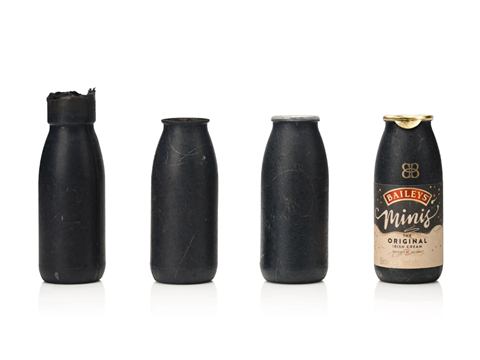
A year after PA Consulting, PulPac and Diageo trialled a fibre-based bottle for Baileys’ Original Irish Cream Liqueur, we revisit the innovation and its reported benefits for recyclability, CO2 reduction, and more.
As part of its pursuit of ‘grain-to-glass sustainability’, Diageo intends to reduce its carbon footprint, in part by supplying its products in alternatives to heavy glass bottles.
Whereas traditional wet fibre technologies consume high levels of water and energy, Diageo has turned to the Bottle Collective and PulPac’s Dry Molded Fibre technology – a solution described as high-speed, low-cost, and recyclable at end-of-life.
“From a sustainability standpoint, Dry Molded Fiber is vastly superior to wet fibre as it eliminates water use and significantly reduces energy consumption,” explained Jamie Stone, a sustainable packaging expert at PA Consulting. “The bottles are fully recyclable and can be disposed of with normal paper recycling and at paper mills, they are more valuable per gram than equivalent cardboard, incentivizing recycling.”
Reportedly, the body of each bottle is made from 90% fluff pulp sourced from plant-based fibres. Approximately 9% of the bottles is attributed to a thin PET liner, which protects the outer paper from the liquid inside and does not need to be separated for recycling; the remaining +-1% consists of a foil seal and other small decorative elements.
“The liner only acts as a very thin barrier, and is more akin to a fine bag blown into the paper bottle, which can still be disposed of in normal paper recycling streams,” spokespeople from PA Consulting and Diageo told Packaging Europe. “The outer Dry Molded Fiber packaging is what gives the bottles a structure, decoration and branding, and has huge potential as an energy-efficient, recyclable, scalable alternative to many single-use materials.”
Apparently, initial life cycle assessments revealed that the bottle’s overall carbon footprint is lower than that of PET or rPET; the total CO2 equivalent emissions were said to be 50% lower than those of virgin PET and over 25% lower than recycled PET.
The first commercial prototype was applied to the 80ml format of Diageo’s Baileys Original Irish Cream Liqueur and distributed at Barcelona’s Time Out Festival last summer. According to PA Consulting, these initial prototypes offered the necessary structural integrity to travel through the supply chain.
Dry Molded Fiber technology is also capable of producing various bottle shapes, ranging from 80ml to 1.5 litres; this is expected to help customers like Diageo maintain their brand identities while transitioning into fibre-based packaging alternatives.
PA Consulting hopes that brands will be able to boost revenue growth by differentiating their packaging and attracting new customers – all while reducing their environmental impacts.
Additionally, the solution is believed to be cost-competitive and scalable for mass volume production.
“When it comes to our packaging, we’re taking an approach of progress over perfection, knowing our packaging will need to evolve along with consumer needs and technological advancements,” the spokespeople continued. “We’re looking for more opportunities to reduce our carbon footprint whilst offering more sustainable and luxury packaging opportunities to our consumers.”
Looking ahead, the Bottle Collective aspires to help customers design packaging from their own waste streams, as well as utilize other recycled materials such as fruit husks and waste leaves.
“We strongly believe in the power of partnerships,” said Viktor Börjesson, chief operating officer at PulPac. “The rapid and high-quality development leading to the Baileys market trial is a powerful testament to how innovation and partnership can drive sustainable packaging solutions.”
Since the Diageo trial, the Bottle Collective has taken further steps to trial paper-based alternatives, including Dry Molded Fiber bottle caps. The idea is to help companies reduce their carbon footprints ‘significantly’ and meet consumer demand for environmentally conscious packaging.
Our senior writer, Victoria Hattersley, sat down with Bottle Collective co-founder Jamie Stone on the Packaging Europe podcast to learn more about the progress of paper bottles across the packaging industry. A recent report also explored some of the roadblocks and bottlenecks, including barrier technology, consumer understanding, and varying recyclability.
If you liked this story, you might also enjoy:
The ultimate guide to the Packaging and Packaging Waste Regulation in 2025
How are the top brands progressing on packaging sustainability?
Everything you need to know about global packaging sustainability regulation in 2025
The key to increasing the use of reusable packaging in supermarkets














No comments yet